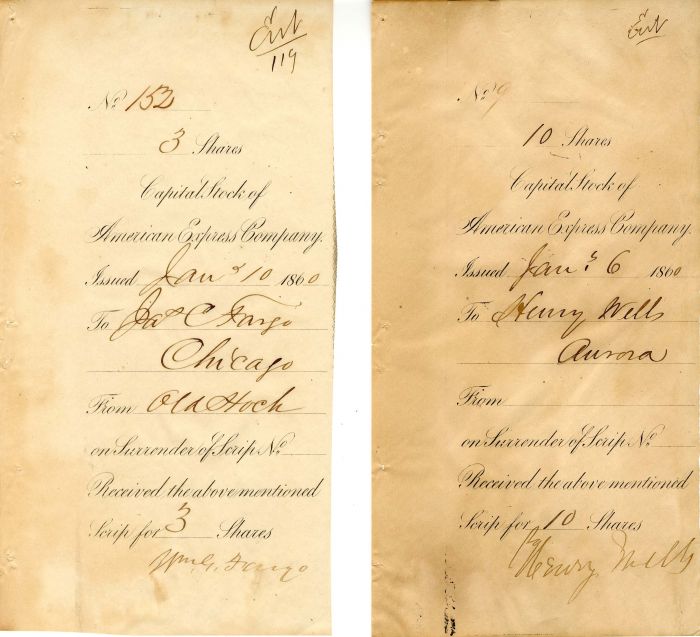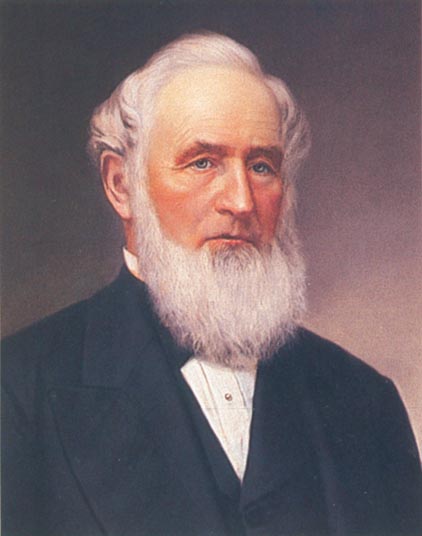Pair of Stock stubs signed James Fargo and Henry Wells
Inv# AM1169 Stock
A pair of stock stubs; one signed by James Fargo and the other by Henry Wells.

James Congdel Fargo (1829-1915) The son of James Fargo, James Congdel Fargo entered the employ of Wells & Co. (in which his brother, William George Fargo was a partner) at Buffalo in 1844. In 1866 after becoming agent and manager of the firm’s successor, the American Express Co., Fargo went to New York as General Superintendent and Manager. In 1881 he became President of the company as well as President of Westcott Express Co. and National Express Co. As president of the American Express Company James C. Fargo was well off and well known. It is not surprising that he felt insulted when he could not get checks cashed during a trip to Europe in 1890. The European bankers were steadfast as Fargo was not known to them, they would not cash his checks. Would Americans always have a cash problem when traveling in Europe? Marcellus F. Berryn, an employee of the American Express Company set out to find a solution. He wrote later: "There’s one thing every person does in a distinctive way. That is writing his signature. Therefore the foolproof device for taking money to strange places must carry the signature of the bearer. It must declare that it will be cashed only when a second, and matching, signature is added before witnesses." On July 7, 1891, Berry was granted four copyrights for what he called "the travelers cheque," and William C. Fargo got the first one. He had no difficulty when he wanted fifty dollars a few weeks later in Leipzig, Germany. In 1891, American Express sold $9,120.00 worth of travelers checks, and the amount has risen every year. During 2000, sales of American Express Travelers Cheques increased to $24.6 billion.

Henry Wells (1806-1878) An American businessman. He started a school for speech disorders in his twenties, due to his own speaking problems. In 1836 he became a freight agent on the Erie Canal. He early entered the express business, becoming an agent for Henry F. Harnden, and in 1841 suggested to George Pomeroy the desirability of establishing an express from Albany to Buffalo. Subsequently Crawford Livingston acted on the proposition, and weekly trips were made between the two points. Beginning in 1843, railroad communication having been established between the two cities, trips were made daily. The firm-name was at first Pomeroy and Co., but was altered to Livingston, Wells and Pomeroy, and, on the retirement of the latter, became Livingston and Wells. In 1845 the business was extended westward from Buffalo to Chicago, with William G. Fargo in charge of that division, under the name of Wells and Co. Meanwhile they established a letter express to carry communications from New York to Buffalo for six cents, while the government charge for the same distance was twenty-five cents. Every means was taken by the National authorities to destroy the practice, but without success. In 1846 a European express was established, with offices in London and Paris. Competition by various companies resulted in the consolidation of the different organizations in 1850, and the formation of the American express company, of which Mr. Wells was elected president. In 1832 he was associated with William G. Fargo and others in forming the firm of Wells, Fargo and Co., for conducting the express business in the far west, and he continued an active officer of that company until its management was transferred to western capitalists after the completion of the Transcontinental railroad. In 1860 the American express company was reorganized with a capital of $1,000,000, and he acted as its president until 1868. He gave $150,000 to found and endow Wells female college at Aurora, New York, one of the first collegiate institutions to be established in this country for the higher education of women.
A stock certificate is issued by businesses, usually companies. A stock is part of the permanent finance of a business. Normally, they are never repaid, and the investor can recover his/her money only by selling to another investor. Most stocks, or also called shares, earn dividends, at the business's discretion, depending on how well it has traded. A stockholder or shareholder is a part-owner of the business that issued the stock certificates.










Ebay ID: labarre_galleries